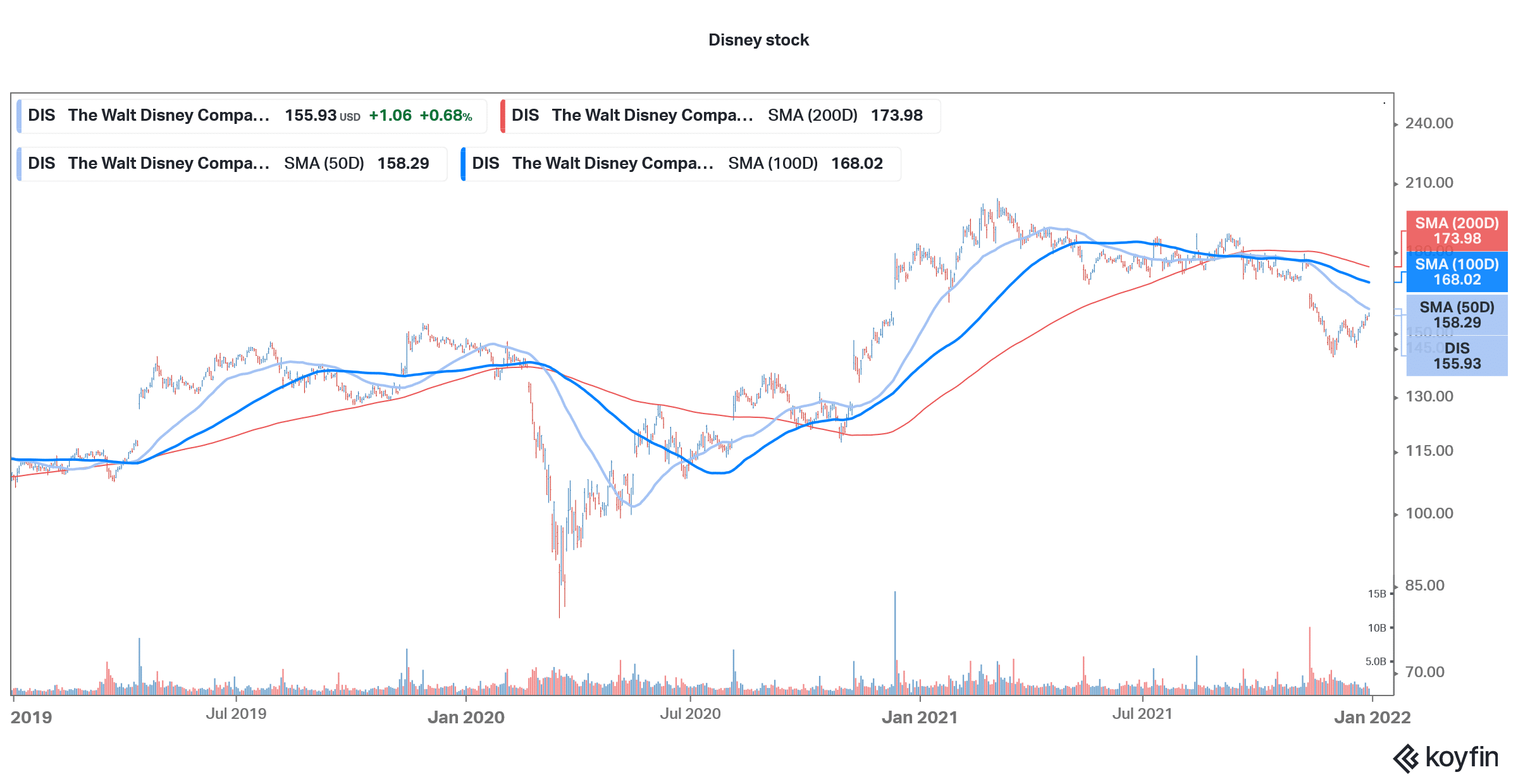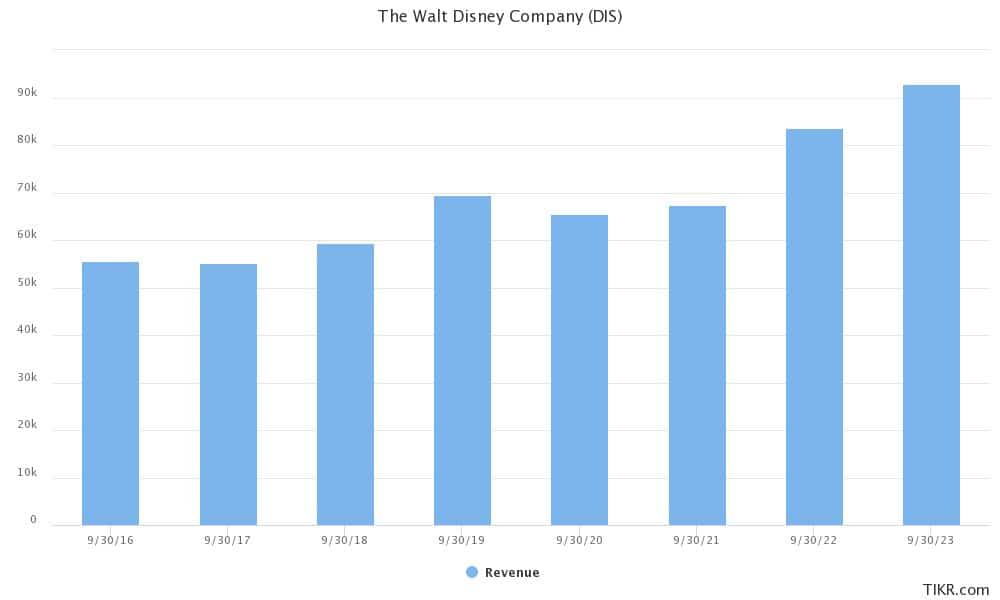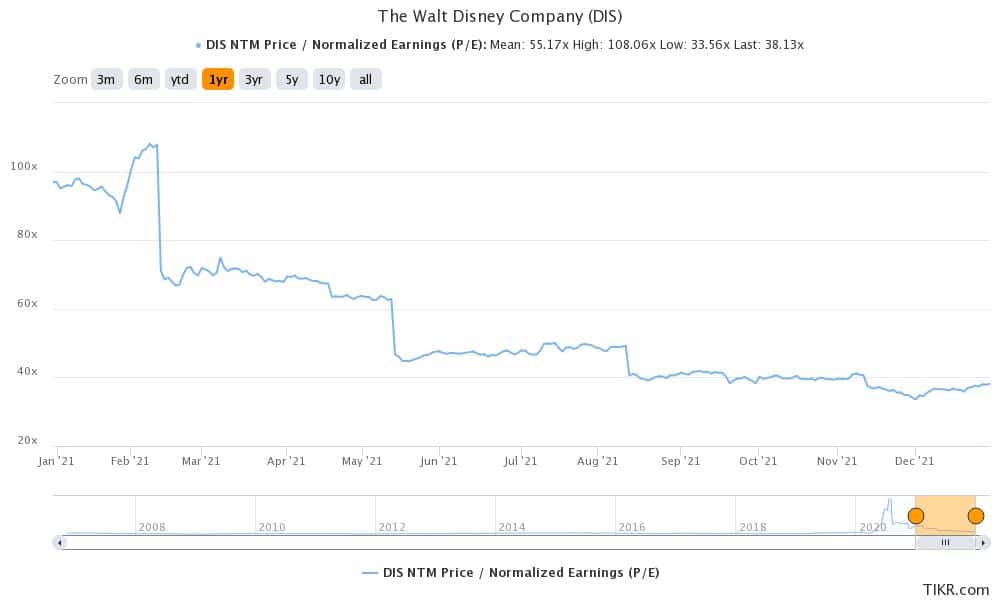Disney Stock Price Down 14% in 2021 – Time to Buy DIS Stock?
Please note that we are not authorised to provide any investment advice. The content on this page is for information purposes only.
2021 has turned out to be another good year for US stock markets and it was the third consecutive year where we saw double-digit returns. However, it was a polarized market and only a few mega-cap stocks accounted for the bulk of the returns. Disney (DIS) was among the worst-performing stocks of the Dow Jones Index and lost 14% in the year.
DIS stock is down 30% from the 52-week highs and is in a bear market territory having fallen over 20% from the highs. That might be disappointing for investors as the S&P 500 is near the all-time highs. DIS stock hit a new 52-week low last month. While it has since recouped some of the losses it is down sharply for the year. What’s the 2022 forecast for the stock and can it rebound from these price levels?
Disney stock recent developments

Disney has extended its deal with YouTube TV which would ensure that channels like ESPN and ABC would be available on the network. Streaming has been a key pillar of growth for Disney and it was a win-win deal between YouTube and Disney.
68% of all retail investor accounts lose money when trading CFDs with this provider.
DIS reported fiscal fourth-quarter earnings
DIS reported fiscal fourth-quarter 2021 in November which disappointed markets. The company’s revenues were $18.5 billion in the quarter, a YoY rise of 26%. The steep rise should be read in context as it came from a lower base. In the full fiscal year, Disney’s revenues increased 3% to $67.4 billion. Disney posted an adjusted EPS of $2.29 in the fiscal year versus $2.02 in the previous fiscal year. In the previous fiscal year, DIS had booked a GAAP loss amid the closure of its Parks, which was its first annual loss in 40 years.
Subscriber growth slowed down
The subscriber growth for Disney slowed down in the quarter and it added only 4.1 million paying subscribers. However, the company had forewarned about the slowdown well in advance, blaming lower content production. Also, in the quarter, the average monthly revenue per subscriber for Disney+ fell to $4.12, which was 9% below the corresponding period last year. The company said that the metric fell amid an unfavorable product mix as it had a higher percentage of Disney+ Hotstar customers in the quarter.
Streaming giants like Netflix and Disney have had to lower their subscription prices in order to attract more customers in emerging markets. Recently, Netflix slashed the prices for some of its plans in India in order to compete in the country’s rapidly growing streaming market.
While the pandemic has meant lower footfalls at Disney’s Parks, they have also led to higher costs and the company incurred $1 billion in COVID-19 related costs last year, which it would amortize instead of expensing in that year only. It expects similar costs in this fiscal year also.

Disney stock forecast
Disney’s forecast depends on the success of both its Parks and streaming divisions. If the daily cases of the omicron variant continue to spike, we could see some restrictions on outdoor activities. While the Biden administration has so far stayed clear of any new major lockdown measures, one can’t totally rule out the possibility.
The company’s streaming business is also facing growth issues in the short term. Wall Street analysts meanwhile have a bullish forecast for DIS stock and it has received a buy rating from 21 out of the 30 analysts polled by CNN Business. Nine analysts have a hold rating. None of the analysts rate the stock as a sell. Disney has a median target price of $198 which is a 27% premium over current prices. The street high target price of $220 is a premium of 41% over current prices.
Brokerages lower Disney’s target price
Brokerages have had a divergent view of DIS stock and some like Barclays and Atlantic Equities have downgraded the stock. Several others have lowered the stock’s target price since the beginning of November. Bank of America, however, continues to remain bullish and said “Following the disappointing F4Q results, we believe DIS has become a “show me” story as investors await signs of DIS+ net adds to re-accelerate and theme parks to show operating leverage as attendance improves.” KeyBanc is also bullish on DIS stock and finds it “significantly undervalued.”
Meanwhile, Jim Cramer is not too perturbed by the pessimism towards Disney. He said that he continues to own Disney stock and called it “a great long-term story.” Here it is worth noting that while over the long-term streaming will add value for DIS stockholders
Disney stock long-term forecast
Disney expects Disney+ subscriber numbers to be between 230-260 million by the fiscal year 2024. After adding the subscribers for Hulu and ESPN+, it expects to have been 300-350 million subscribers by then. The company was recently rumored to spin off ESPN+ but it has denied the rumors.

Over the long term, the streaming business would contribute significantly to Disney’s earnings. While the operations are currently posting losses, they are expected to become profitable in the coming years and drive the company’s profitability.
During the fourth-quarter earnings call, Disney CEO Bob Chapek said “We continue to manage our DTC business for the long-term, and are confident that our high-quality entertainment and expansion into additional markets worldwide will enable us to further grow our streaming platforms globally.”
Should you buy DIS stock?
The omicron variant has led to uncertainty for reopening plays like Disney. Looking at the charts, it is not looking too bullish and trades below the 50-day, 100-day, and 200-day SMA (simple moving average). The stock first needs to cross above the 50-day SMA to signal a breakout.
From a valuation perspective, DIS stock trades at an NTM (next-12 months) PE multiple of 38.1x. The multiples might seem high but they are high because of the near-term depression in earnings. Also, the company’s streaming business would contribute to the earnings only in the long term.
Disney stock looks a good buy at these prices but the omicron variant might play the spoilsport. It might be prudent to do a staggered buying in the stock and build long-term positions taking advantage of the recent underperformance.






